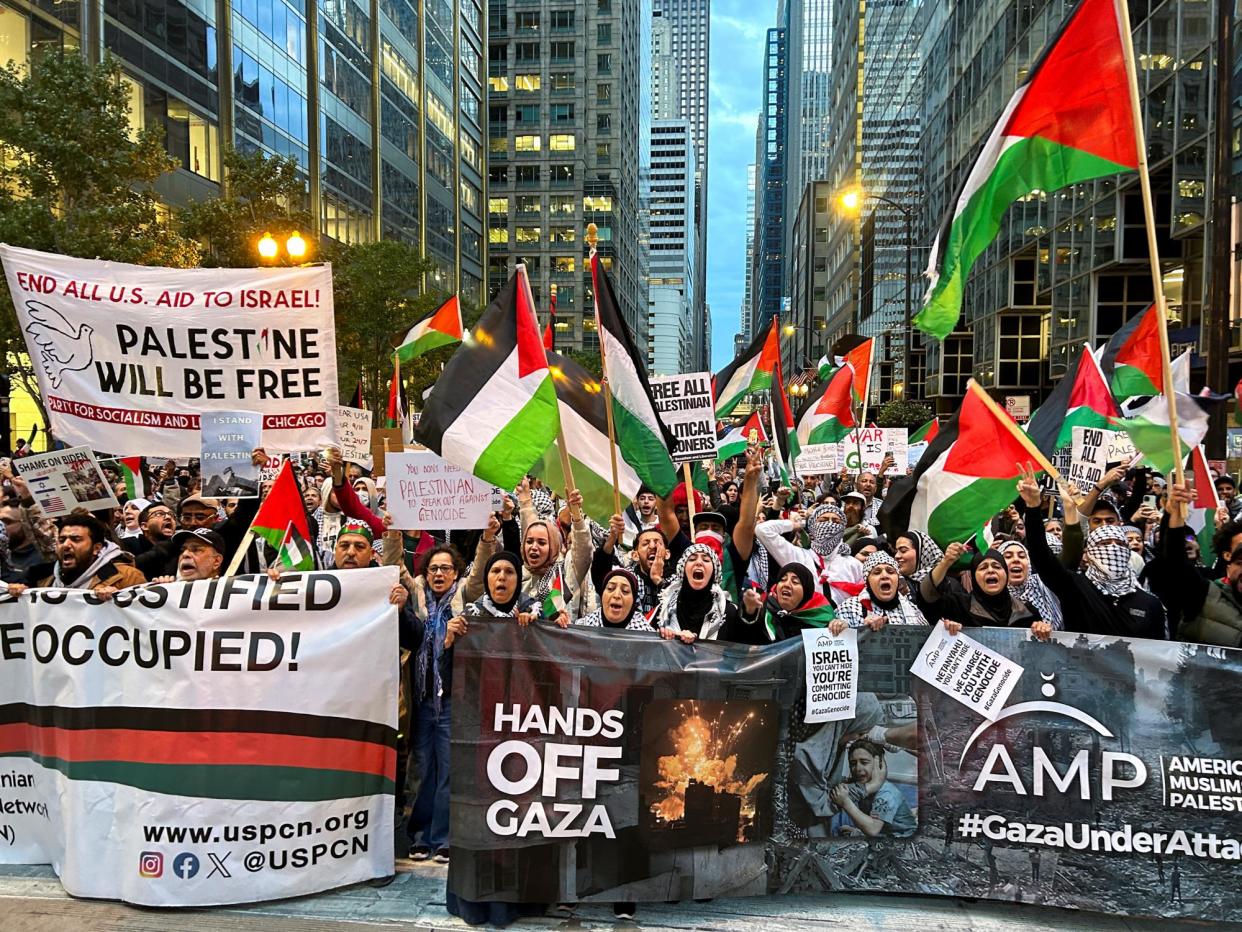Muslim leaders in Chicago spurn meeting with Biden officials citing Gaza war

- Oops!Something went wrong.Please try again later.
Ahead of next week’s primary in Illinois, more than 40 Muslim, Palestinian and Arab American leaders and groups in Chicago refused a meeting with White House officials, citing the US’s continued funding of Israel’s war on Gaza.
Related: Washington and Georgia protest votes raise pressure on Biden over Gaza war
In a letter sent to the White House on Thursday, the leaders said there was “no point” in additional meetings when they had already made clear their demand for a permanent ceasefire to the Biden administration through prior discussions, protests and media interviews. “We believe another meeting would only act to whitewash months of White House inaction followed by meek handouts. We are interested in serious action,” they wrote in the letter.
They continued: “Offering a belated trickle of aid, whether airdrops or temporary piers, to captive Palestinian civilians who continue to be shot like fish in a barrel, but remaining unwilling or unable to cease the killing is like dishing out Band-Aids with one hand, while wielding an axe with the other.”
More than 100,000 Arab Americans live in Chicago, according to the US Census Bureau’s American Community Survey, while at least 350,000 Muslims live in Illinois.
The refusal follows similar actions by Muslim and Arab American groups throughout the nation who are furious with Joe Biden’s handling of Israel’s war in Gaza, where more than 31,000 people have been killed since 7 October, according to Gaza’s health ministry. In late January, 15 Michigan leaders cancelled a listening session with Biden’s re-election campaign.
“They’re approaching the community now to speak about the issues unfolding as if they’re electoral problems or political ones. And for us, that’s not what these are,” Abdullah Hammoud, the mayor of Dearborn, Michigan – home to one of the nation’s largest Arab American population – said at the time. “This is an issue of humanity. Palestinians are not important because of polling numbers.”
In early February, Palestinian Americans rejected an invitation to a roundtable discussion with the US secretary of state, Antony Blinken, which they called a “box-ticking exercise”.
Last month, Muslim and Arab American leaders met with Biden’s senior advisers in Dearborn, Michigan, where some attendees said that officials listened to their concerns. The deputy national security adviser, Jon Finer, admitted to “missteps” in responding to Israel’s war in Gaza at the meeting.
Thursday’s rejection comes alongside growing concern within the Biden administration as Democratic voters have registered mounting warnings in recent primaries. More than 100,000 Michigan voters in the state’s Democratic primary selected “uncommitted” last month in protest of Biden’s position on the war. Similar efforts took off in Washington, Minnesota and Georgia.
Illinois’s primary is next week. While the state does not have an “uncommitted” option on its ballots, some leaders are still encouraging the electorate to cast a protest vote.
“In Illinois, a lot of the Palestinians in the Muslim American community are encouraged to either leave it blank, or write ‘Gaza’ as a way for us to show that we are coming to the polls. We’re still voting; we’re voting for other elected officials,” Deena Kishawi with American Muslims for Palestine-Chicago told ABC7 Chicago.
A White House official told Politico that senior aides will still meet with some local leaders in Chicago as “part of an ongoing process to engage with communities impacted by the Mideast conflict”.
In the letter to the White House, the Chicago groups and leaders made clear they were pushing for the US to allow for a flow of humanitarian aid to Gaza, a reinstatement of funding to the United Nations agency for Palestinian refugees, accountability for Israel, and “justice and liberation for Palestinians”.
“That is what history will judge us by, not more token meetings when every day is of the essence,” they concluded in the letter.

